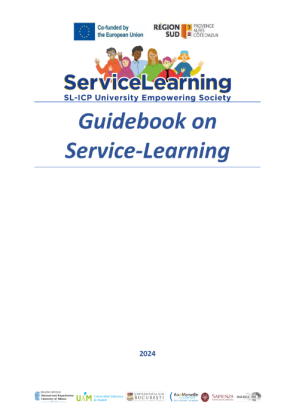Leader: University of Bucharest (Romania )
The final guide aiming to facilitate and promote the implementation of Service-Learning practices is now available!
Main goals
Develop a guide to facilitate the implementation of Service-Learning and collaboration between the different stakeholders (representatives of civil society and university communities; teachers, students, decision-makers and administrators)
Promote Service-Learning practices
Specific objectives
Promoting Service-Learning practices in European universities
Share practices with an innovative European dimension
Improving the implementation of Service-Learning in higher education
Activities carried out
From 25 to 28 June 2024, the Eurasia Net team responsible for coordinating the “KA2 service-learning” project participated in the European Forum on service-learning which brought the project to a close. During this highly instructive week for the whole consortium, 10 interactive and stimulating sessions were held to share feedback as well as the eagerly awaited presentations and awards ceremony for projects led by socially committed students. These included two projects by French students at Aix-Marseille University:
- The “Park4move” project”, presented by Lucas DANIEL and Antoine RIGAT (students at BUT Electrical Engineering and Control in Salon-de-Provence), aims to ensure access to car parking spaces reserved for people with disabilities by developing a mobile application dedicated to managing PRM (People with Reduced Mobility) spaces using sensors. Watch the project video.
- The “Shepard and Islan Project”, presented by Coralie RIBA, Clémentine BARRY et Jnyanamurthi VADIAVALOO (students in Master Digital law in Aix-en-Provence), aims to set up art exhibitions to stand up against racial and sexual discrimination through the prism of the LGBTQIA+ community and art. Watch the project video.
These two projects, along with those presented by students from other universities, highlighted the value of service-learning for both the academic and civil spheres. The forum was a real opportunity for the 80 participants from the five countries to share their experiences and work together to finalize and disseminate the final guide to facilitating the implementation of service-learning.

